A Once A Year Experience! Midnight Temple Visit to Nishiarai Daishi

If you're in Japan for New Year's, why not take part in hatsumode, the first shrine or temple visit of the new year that takes place from New Year's Eve to New Year's Day? Here is what guests at Emblem Hostel Nishiarai experienced at their hatsumode!
If you are traveling in Japan over New Year’s, there is one event we'd like to take part in. It is the Japanese practice of hatsumode. The very first shrine or temple visit of the New Year is known as hatsumode in Japanese, and it is a time to pray for good luck in the year to come.
While hatsumode may take place anywhere from New Year's Day (January 1st) until January 7th, there are many people who head out on omisoka (New Year’s Eve) at midnight to visit a temple or shrine. This midnight act of worship only happens once a year in Japan, so if you are planning a trip here during that time, why not take part in this special event yourself?
In order to learn more about hatsumode, we, along with guests from Emblem Hostel Nishiarai, departed on New Year’s Eve for Nishiarai Daishi to experience this event. Nishiarai Daishi is a temple located in Nishiarai, in the Adachi ward of Tokyo, that is famous for its ability to ward off evil.
Read also:
From Lucky Bags To Shrine Visits - Enjoy New Year The Japanese Way!
Omisoka (New Year’s Eve) - Japanese Encyclopedia
Go To A Temple Festival In Japan! Nishiarai Daishi’s ”Osame no Daishi”
Lively Even at Midnight! Nishiarai on New Year’s Eve
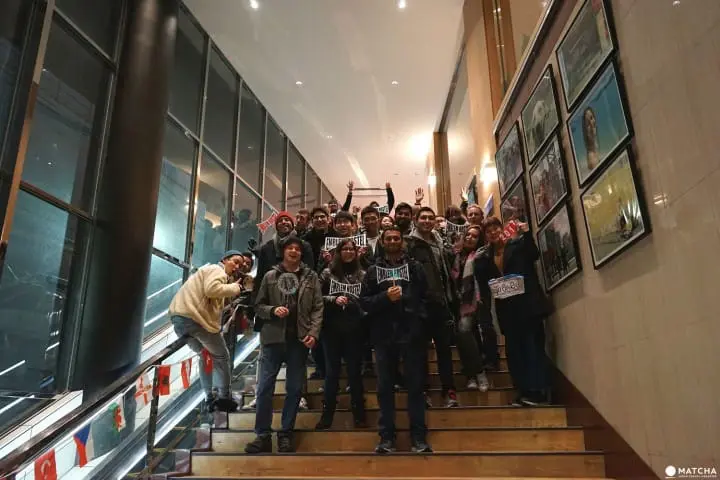
During the night from New Year’s Eve to New Year’s Day, those wanting to participate in this special hatsumode event gathered in the lobby of Emblem Hostel Nishiarai at 1 o'clock in the morning!
Since it was an hour after midnight, everyone cheerfully greeted one another with ”Happy New Year!” and ’Akemashite omedeto gozaimasu!’
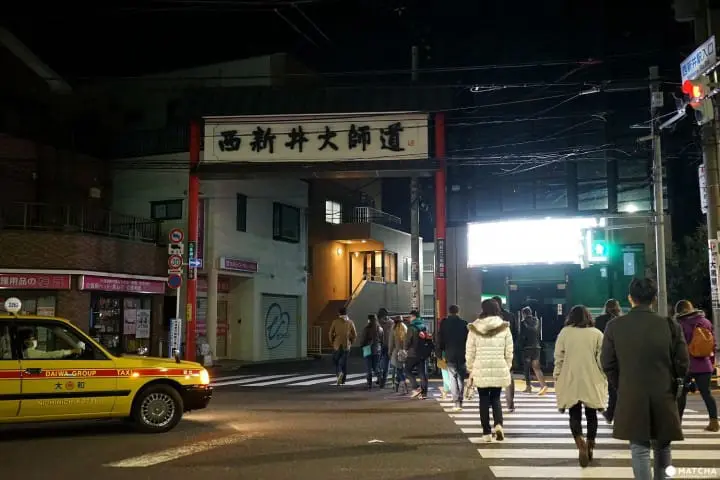
From the hostel to Nishiarai Daishi it is only a 15-minute walk. And despite it being so late at night, the city was very lively still.
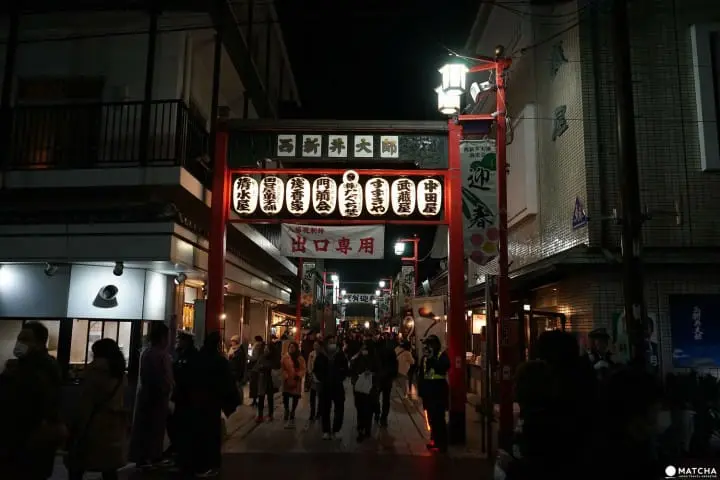
When we arrived at the temple gate, everyone was surprised to see how many people there were! The only time of year you can visit a temple or shrine at midnight is New Year’s Eve. The atmosphere at Nishiarai Temple was like that of a festival. On either side of the pathway to the main temple building there were many vendors that caught our attention, but we thought we should greet the guardian deities of Nishiarai Daishi first.
How to Vist a Temple on New Year’s Eve
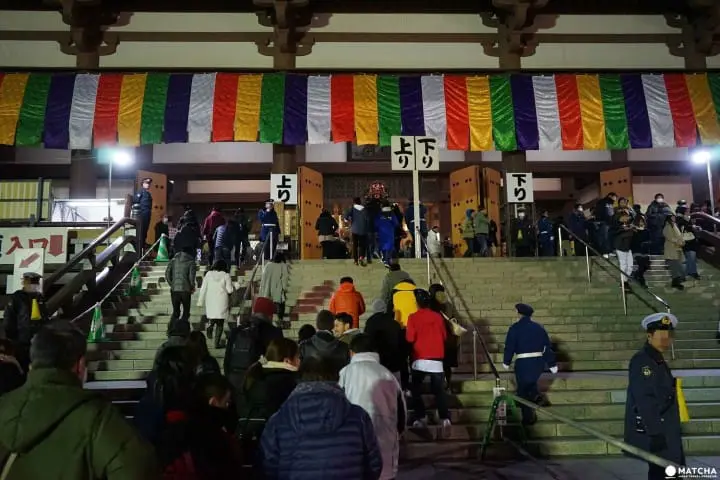
Because there are so many people at the temple for hatsumode, when you arrive in front of the main hall, you must proceed according to the instructions of the staff. The stairs leading up to the temple building are clearly marked with ’up’ and ’down’ sides, so it is important to watch your step and pay attention to the actions of those around you.
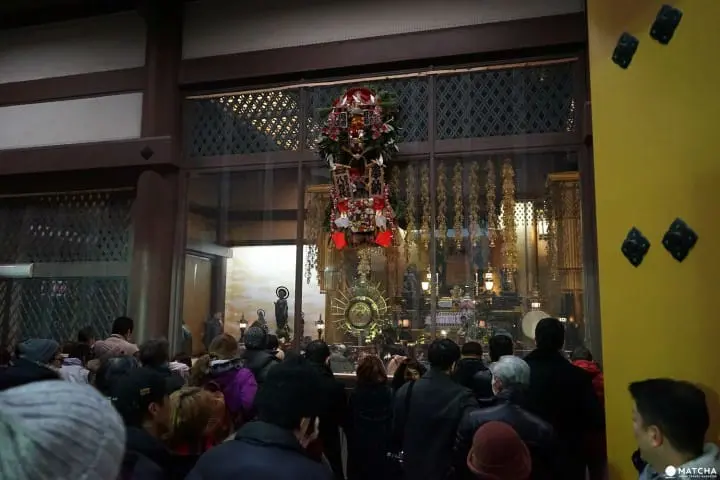
The main hall is decorated with a special New Year’s decoration, and if you peer inside, you will see monks and priests invoking special prayers against bad luck or misfortune inside.
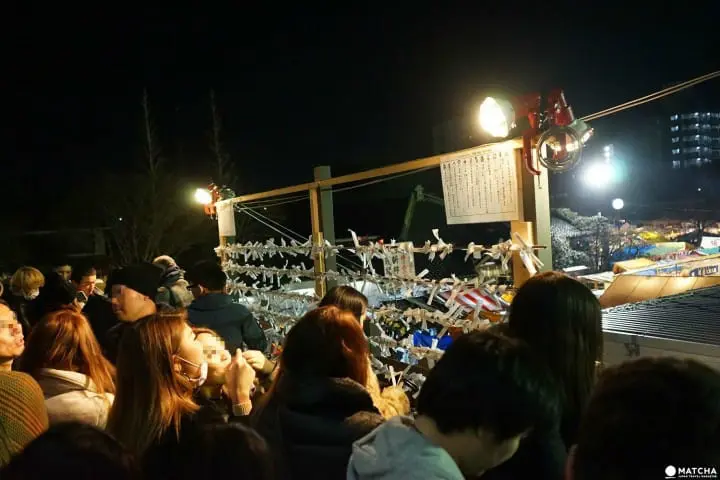
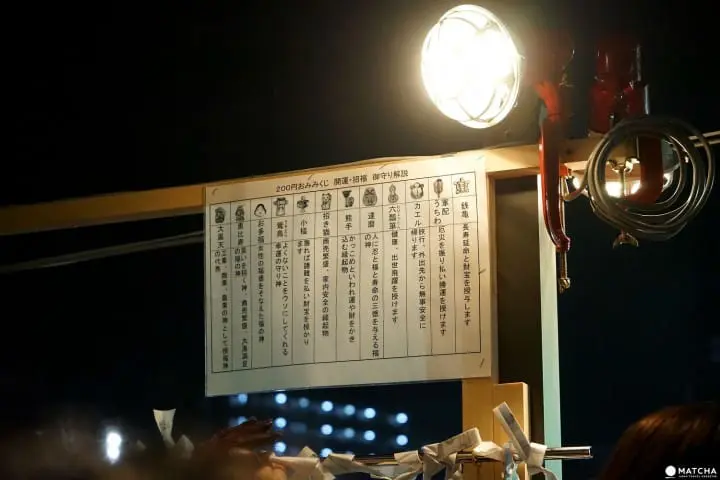
When coming to a temple or shrine for hatsumode, it's a good idea to get an omikuji too, so you can see what your fortunes for the year ahead will be. At Nishiarai Daishi there are also omikuji that come together with lucky amulets. Amulets with a turtle represent longevity and long-life, while frog amulets offer protection for travelers; each talisman has its own meaning, so please take good care of them when you are heading home.
See the Shops and Enjoy Nishiarai’s Specialties
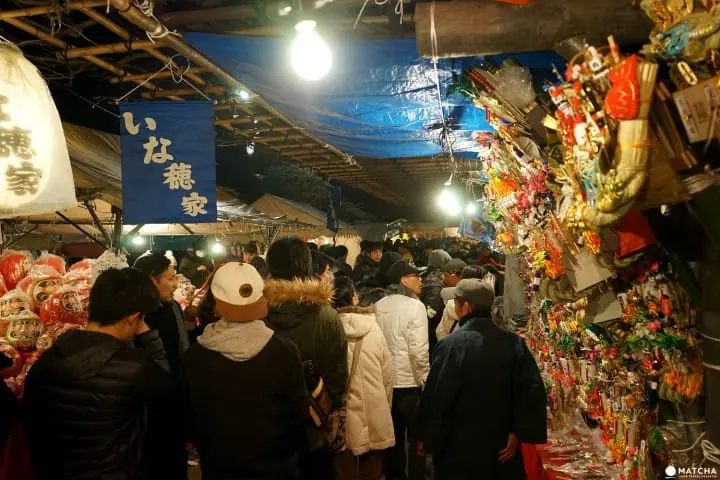
After visiting the temple and making your prayers, it's great fun to look around the stalls in the precincts; here you will find a part of Japanese culture that can only be enjoyed at New Year’s.
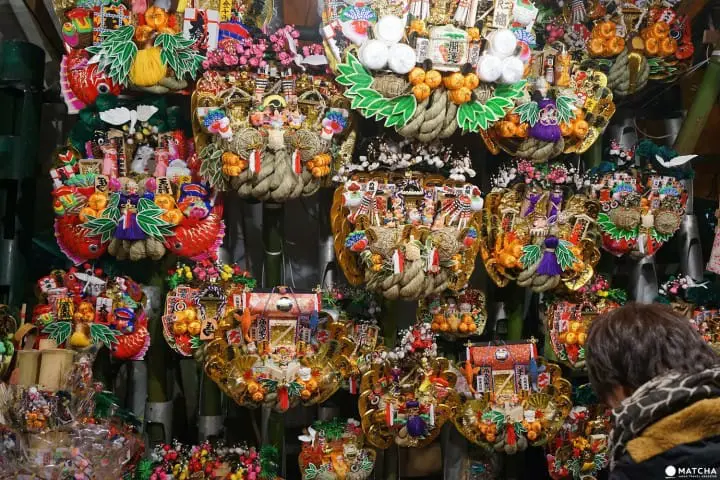
Special kumade (*1), which are usually only sold at shrines during the November Tori no Ichi festival are also being sold at this time. The kumade are said to bring about prosperity in business.
*1 Kumade: a decorated wooden rake that is said to 'rake in' good fortune and prosperity for businesses.
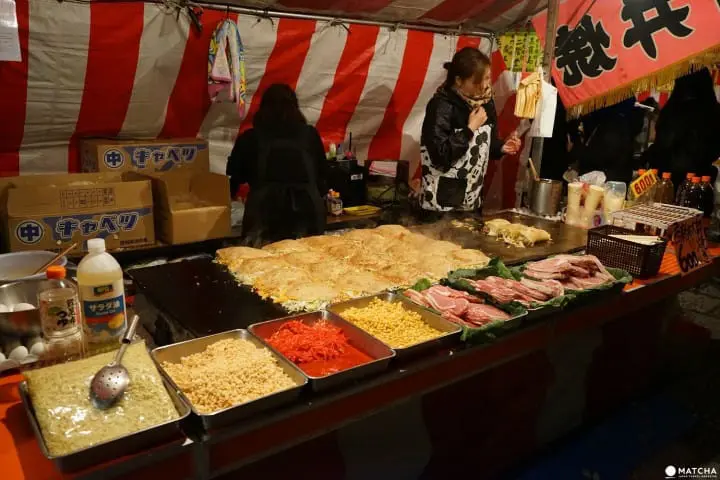
You can enjoy lots of Japanese festival foods at these stalls as well. Here is Nishiarai-yaki, the local take on okonomiyaki, a popular savory pancake dish.
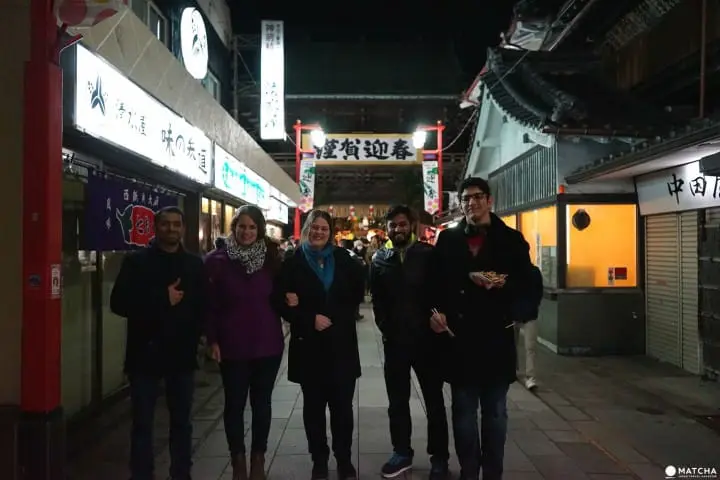
Here you can see the guests of the hostel enjoying their Nishiari-yaki as they stroll through the precincts. Everyone spoke about the New Year’s traditions in their home countries while also talking about and experiencing this unique part of Japanese culture. Everyone had a fantastic time at this once a year midnight temple visit.
In Conclusion
What did you think of this midnight temple visit? Taking part in a once a year midnight visit to a temple or shrine is sure to make for a very memorable trip to Japan, so if you plan to visit Japan at New Year’s, please head out for hatsumode too!
You May Also Like:
From Lucky Bags To Shrine Visits - Enjoy New Year The Japanese Way!
Omisoka (New Year's Eve) - Japanese Encyclopedia
Go To A Temple Festival In Japan! Nishiarai Daishi's "Osame no Daishi"
EMBLEM Hostel Nishiarai: A Bond Between Travelers And Locals
Japanese Encyclopedia: Hatsumode
Ramona, English content editor at MATCHA since 2016, has been practicing ikebana flower arrangement (Ikenobo School) and tea ceremony (Omote Senke) since 2012. She arrived in Japan in 2012 as a graduate student with a focus on Japanese literature and performing arts. As a travel editor and writer, Ramona has visited and documented 40 of Japan's prefectures with a focus on art, history, traditional Japanese crafts, and performing arts.






































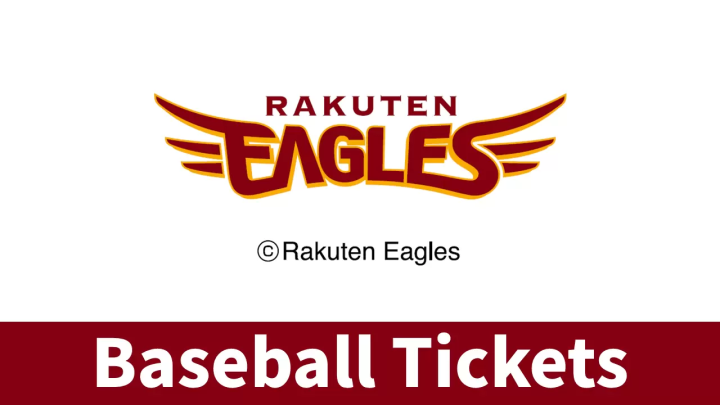
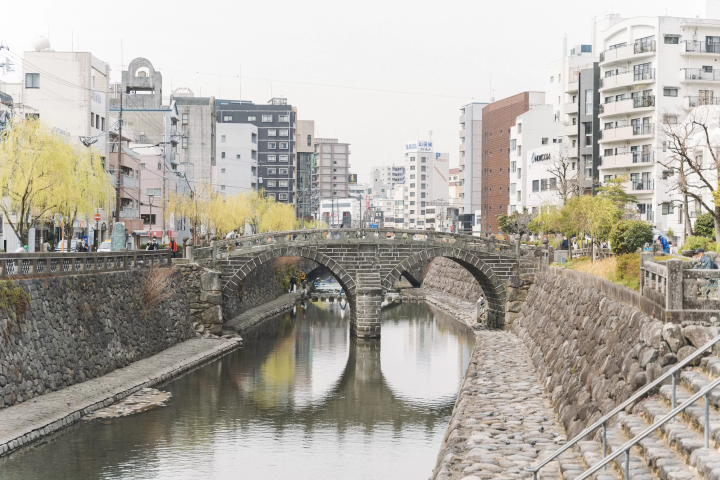
![[During Your Kumano Trip] Cape Shionomisaki Tourist Tower](https://resources.matcha-jp.com/resize/720x2000/2025/11/05-249097.webp)
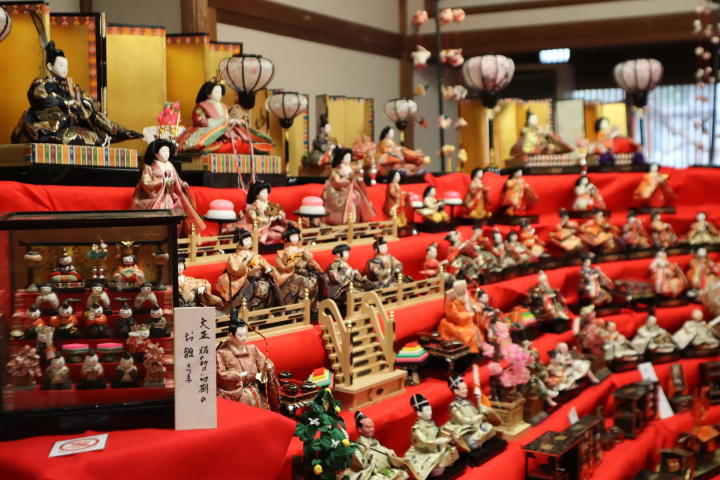
![[Kagoshima] Enjoy Minamisatsuma City to the Fullest! A Guide to the Scenic Beauty and Culture of Five Areas](https://resources.matcha-jp.com/resize/720x2000/2026/02/15-258755.webp)